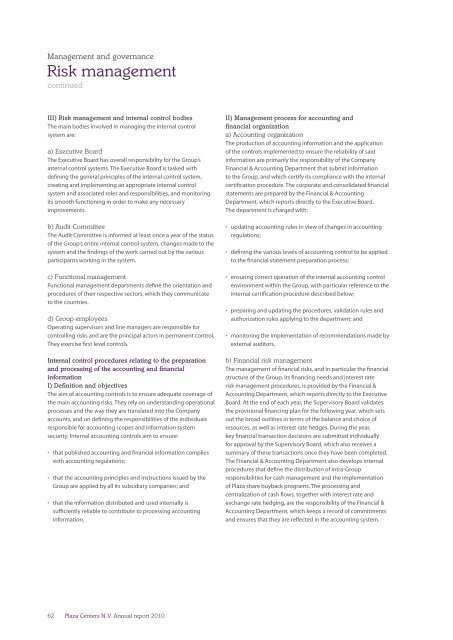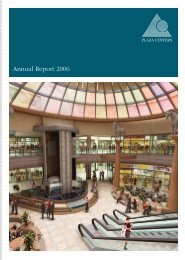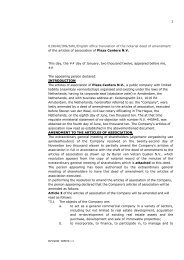Annual report 2010 - plazacenters
Annual report 2010 - plazacenters
Annual report 2010 - plazacenters
You also want an ePaper? Increase the reach of your titles
YUMPU automatically turns print PDFs into web optimized ePapers that Google loves.
Management and governance<br />
Risk management<br />
continued<br />
III) Risk management and internal control bodies<br />
The main bodies involved in managing the internal control<br />
system are:<br />
a) Executive Board<br />
The Executive Board has overall responsibility for the Group’s<br />
internal control systems. The Executive Board is tasked with<br />
defining the general principles of the internal control system,<br />
creating and implementing an appropriate internal control<br />
system and associated roles and responsibilities, and monitoring<br />
its smooth functioning in order to make any necessary<br />
improvements.<br />
b) Audit Committee<br />
The Audit Committee is informed at least once a year of the status<br />
of the Group’s entire internal control system, changes made to the<br />
system and the findings of the work carried out by the various<br />
participants working in the system.<br />
c) Functional management<br />
Functional management departments define the orientation and<br />
procedures of their respective sectors, which they communicate<br />
to the countries.<br />
d) Group employees<br />
Operating supervisors and line managers are responsible for<br />
controlling risks and are the principal actors in permanent control.<br />
They exercise first level controls.<br />
Internal control procedures relating to the preparation<br />
and processing of the accounting and financial<br />
information<br />
I) Definition and objectives<br />
The aim of accounting controls is to ensure adequate coverage of<br />
the main accounting risks. They rely on understanding operational<br />
processes and the way they are translated into the Company<br />
accounts, and on defining the responsibilities of the individuals<br />
responsible for accounting scopes and information system<br />
security. Internal accounting controls aim to ensure:<br />
• that published accounting and financial information complies<br />
with accounting regulations;<br />
• that the accounting principles and instructions issued by the<br />
Group are applied by all its subsidiary companies; and<br />
• that the information distributed and used internally is<br />
sufficiently reliable to contribute to processing accounting<br />
information.<br />
II) Management process for accounting and<br />
financial organization<br />
a) Accounting organization<br />
The production of accounting information and the application<br />
of the controls implemented to ensure the reliability of said<br />
information are primarily the responsibility of the Company<br />
Financial & Accounting Department that submit information<br />
to the Group, and which certify its compliance with the internal<br />
certification procedure. The corporate and consolidated financial<br />
statements are prepared by the Financial & Accounting<br />
Department, which <strong>report</strong>s directly to the Executive Board.<br />
The department is charged with:<br />
• updating accounting rules in view of changes in accounting<br />
regulations;<br />
• defining the various levels of accounting control to be applied<br />
to the financial statement preparation process;<br />
• ensuring correct operation of the internal accounting control<br />
environment within the Group, with particular reference to the<br />
internal certification procedure described below;<br />
• preparing and updating the procedures, validation rules and<br />
authorization rules applying to the department; and<br />
• monitoring the implementation of recommendations made by<br />
external auditors.<br />
b) Financial risk management<br />
The management of financial risks, and in particular the financial<br />
structure of the Group, its financing needs and interest rate<br />
risk management procedures, is provided by the Financial &<br />
Accounting Department, which <strong>report</strong>s directly to the Executive<br />
Board. At the end of each year, the Supervisory Board validates<br />
the provisional financing plan for the following year, which sets<br />
out the broad outlines in terms of the balance and choice of<br />
resources, as well as interest rate hedges. During the year,<br />
key financial transaction decisions are submitted individually<br />
for approval by the Supervisory Board, which also receives a<br />
summary of these transactions once they have been completed.<br />
The Financial & Accounting Department also develops internal<br />
procedures that define the distribution of intra-Group<br />
responsibilities for cash management and the implementation<br />
of Plaza share buyback programs. The processing and<br />
centralization of cash flows, together with interest rate and<br />
exchange rate hedging, are the responsibility of the Financial &<br />
Accounting Department, which keeps a record of commitments<br />
and ensures that they are reflected in the accounting system.<br />
62<br />
Plaza Centers N.V. <strong>Annual</strong> <strong>report</strong> <strong>2010</strong>








